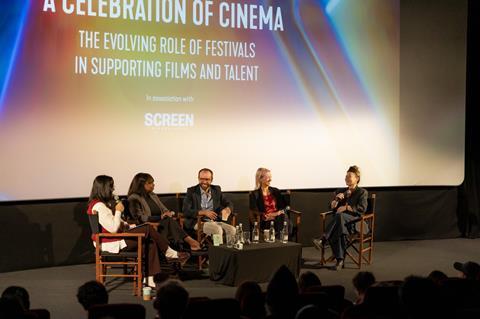International festivals should be “mindful” of the slowdown in distribution deals signed for festival films, said Jacqueline Lyanga, the Berlina
International festivals should be “mindful” of the slowdown in distribution deals signed for festival films, said Jacqueline Lyanga, the Berlinale’s co-director of film programming, at the BFI London Film Festival (LFF).
“It used to be that at the festivals, especially if you had a market, that there would be really big sales, and every film, or all the world premieres, or half the world premieres would sell,” explained Lyanga while speaking at a panel on ‘The Evolving Role Of Film Festivals In Supporting Films And Talent’ on October 10.
“And that’s really changed.
“Because of the challenges in the distribution landscape, some of the films take around five or six months [to find distribution],” she continued.
“There are many films where the deals weren’t announced until Toronto or are getting announced now. So that’s also just something to be mindful of.
“Distributors are, I guess to some extent, some might say risk averse, but I would say, more careful,” Lyanga added. “There are some tiny distributors popping up, which has been quite encouraging.
“Small distributors with exciting, new approaches, but they’re taking really personal, deliberate approaches and not spending as much money as they have in the past.”
Puzzle of programming
The speakers also discussed how different programmers work with each other to navigate the overlaps of festivals.
“There are international and local reasons why you can’t just move a festival,” said Goteborg’s artistic director Pia Lundberg.
Goteborg, which ran January 24 to February 2 this year, overlapped with both Sundance and Rotterdam festivals. Lundberg explains how she was in “close dialogue” with both festivals to negotiate world premieres and agree on which films could travel straight to the other festival afterwards.
“That’s really a puzzle of programming an international film festival,” Lundberg added. “We compete for the same films. There is a high competition for premiere stages and it’s really something that you need to work with [the other festivals] a lot.”
When debating whether festivals should offer more online programming, LFF’s Kristy Matheson pointed out the logistical challenges that come with that. “We try and have some elements of the programme that are online, but really, it’s very hard to run two film festivals at the same time,” she said.
The LFF shorts competition and selected features are available online, as are a number of the festival’s Screen Talks.
“To do an online festival, it is another festival. Our team really concentrate on the physical screenings here in London.”
Elsewhere, Cannes’ Critics’ Week programmer Thomas Rosso discussed the importance of festivals acting as a space for free speech.
“Independence is really the core mission of our section, and it reflects the independence of film criticism itself,” Rosso explained. “The idea is to really advocate for the freedom of speech, the freedom of creation and the freedom, of course, from political censorship or pressure, but also commercial, and sometimes an economic pressure and censorship.
“That should be the point of every film festival in the world.”

COMMENTS